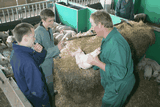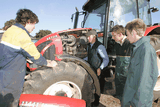College Farm Focus: Training in East Anglia with Easton College

Success stories are scarce in farming, scarcer still in agricultural education. So the bright light that is Norfolk’s Easton College merits particular attention.
“We’re not a fount of wisdom to solve all farming’s problems, but we can demonstrate some of the solutions that the industry needs,” says principal David Lawrence.
“And for us the biggest issues are developing skilled workers for the future and ensuring today’s farmers and their staff have the expertise to cope with our fast moving industry.”
That is where the college farm comes in, not only providing a teaching backdrop, but also showing the industry is dynamic and forward looking, and worth getting involved with.
“For every student interested in farming we can get 100 wanting a career with the RSPCA, yet the job opportunities are far greater in farming,” says head of agriculture Ian Revill. “Our goal is to take youngsters keen on animal welfare, for example, and stimulate their farming interest, by getting them involved with hands-on livestock work.”
So, although fully commercial, the farm includes small demonstration units as backdrops for students and others seeking to improve their skills. It is a policy that has paid off, with a significantly greater uptake of farm-based courses last autumn.
Experiences
FARM FACTS |
|
Some farm operations have been contracted out, but with protocols to add value. “We couldn’t deliver all the experiences of modern arable farming, so Morley Farms provides a fully-costed stubble-to-stubble service, and we draw in experience of other operations through the Arable Excellence initiative,” explains farm and resources director Chris Nix.
A big issue now is whether to keep growing beet when it only yields 54t/ha. “Can we find ways of growing it more effectively on this land or do we have to look at other options for the rotation? It is a big issue for many growers in the area,” Mr Nix reflects.
Input from a neighbouring farmer supports the dairy unit, which is looking at a new breeding programme and the use of potato waste as a silage clamp sealant and heavy duty plastic as a multi-year clamp wall lining. “If the potato waste has some feed value that will pay for the cost of haulage, making it worthwhile,” he notes.
The open pig and poultry units are run as mini-versions of commercial units, with considerable industry input to show best practice. “People said we were mad running pig and poultry units side by side, but the strongly hygiene-focused approach we have been able to demonstrate in the poultry unit has really impressed the pig industry,” says Mr Lawrence.

Up-skilling
The units also support those looking for up-skilling, to keep pace with fast moving industry requirements. “Very often it is a case of sharing experiences against a backdrop of a commercial unit, with complete costings available for scrutiny, to help drive the debate about managing the business and its resources,” notes Mr Revill.
Mechanisation training uses a sophisticated IT-based facility, with computer simulated diagnostic testing. “It removes the time pressure and cost implications of working on real machines in the field, and we can simulate far more problems, which makes for a better training experience. It is really helping to attract students who will become the technically skilled workers of the future.”
The farm has a fledgling organic operation, with potatoes as the core value-driving crop. There is also a strong focus on environmental issues, including best practice field margin management and strategies for optimising farm income from environmentally sensitive areas, such as the flood meadows alongside the River Yare, which are a strong prospect for Higher Level Stewardship payments.
A big investment in student facilities has definitely paid off, says Mr Lawrence. “We used to be a classic county farm college, stuck out in Norfolk. It just wasn’t attractive to today’s students. Investing in decent leisure facilities and modern teaching areas means students are now happy to be here and see farming as a professional industry.”
Land sales for development raised £2.5m towards financing the refurbishment/rebuilding of almost every building on the site. But the £8m total invested over eight years has also been supported by trade and industry partnerships, notes Mr Lawrence.
As at most farm colleges, equine and small animal courses have flourished, but not at the expense of farming. “We needed them to achieve the critical mass to do what we wanted to do, but they do not diminish our core emphasis on farming.” Today land-based training accounts for 60% of the college’s activity.

£6.8m budget
Thirteen years ago Easton had just 85 staff, no higher education courses and a budget of just £1.2m. It now serves 550 full-time and 3250 part-time students each year, caters for 111 higher education students and has a budget of £6.8m.
The college has clearly become a teaching centre well worth watching.
COLLEGE FACTS |
|
Related Links:
